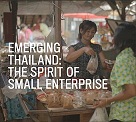Silk Farmer

In this Photo:
The DVD showcases a seller in a Chachoengsao province marketplace.
Silk farming, or sericulture, is the rearing of silkworms to produce raw silk. It is one of the most important cottage industries in Thailand, particularly in the northeast provinces, like Sisaket where the silk farmer in the film lives. Most silk farming is done by women, who also dye the thread and weave it into cloth. The silk farmer in the video is also a rice farmer. When she is not working in her rice fields, she tends to her mulberry trees and raises silkworms.
Silkworms only eat mulberry leaves and fruit. The worms are fed fresh leaves several times a day. When the silk worms are mature, they spin a cocoon of silk, a chrysalis from which a butterfly arrives if the farmer after three days doesn't boil the cocoons and extract the silk. Boiling also frees the silk filament from the larvae and is known as the degumming process. The silk filaments are combined to form thread, which is wound onto reels and plied together to form yarn.
The entire process from egg to silk cocoon takes about three weeks. Some of the chrysalises are allowed to hatch and the butterflies mate, producing about 300 eggs each, then the butterflies die. Only about half of the insects will make it to maturity.
Sericulture has been passed down for generations. This silk farmer learned from her grandmother and neighbors. She sells the silk to villagers and tourists for a higher price than she can get from a silk dealer. The village in which she lives is part of the "One Tambon One Product" program, a government initiative that encourages entrepreneurship by supporting locally-made products in each tambon (subdistrict). These villages receive help marketing and promoting their products.